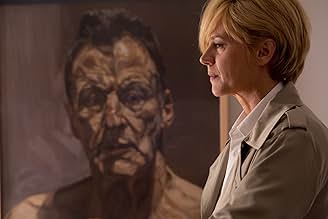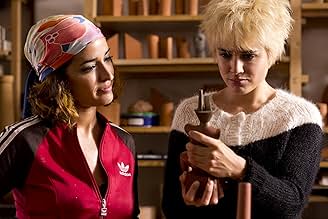Julieta
- 2016
- Tous publics
- 1h 39min
NOTE IMDb
7,1/10
35 k
MA NOTE
Après une rencontre fortuite, une femme au coeur brisé décide d'affronter sa vie et les évènements les plus importants concernant sa fille qu'elle a perdue de vue.Après une rencontre fortuite, une femme au coeur brisé décide d'affronter sa vie et les évènements les plus importants concernant sa fille qu'elle a perdue de vue.Après une rencontre fortuite, une femme au coeur brisé décide d'affronter sa vie et les évènements les plus importants concernant sa fille qu'elle a perdue de vue.
- Réalisation
- Scénario
- Casting principal
- Nomination aux 1 BAFTA Award
- 14 victoires et 62 nominations au total
Darío Grandinetti
- Lorenzo
- (as Dario Grandinetti)
Ramón Agirre
- Inocencio - portero
- (as Ramón Aguirre)
Avis à la une
It's usually worth watching an Almodovar movie if only for the exquisite use he makes of the camera and the quality of acting he manages to extract from his cast. That is certainly the case with Julieta in which every scene is beautifully composed. Andalusia, Galicia and Madrid have never looked so enticing. Having said that, the narrative of this movie is really poor. It revolves in some sense around the theme of guilt but that doesn't stand up well to a close examination. The twist at the close is pure melodrama and the film doesn't really end at all. Almodovar just brings down the shutters on the movie. So this is very much a mixed bag. Lovely filming, lovely actors, lovely decor, but dare I say it, this is basically an art-house soap.
In Madrid, the middle-aged Julieta (Emma Suárez) is packing her books to move to Portugal with her boyfriend Lorenzo (Dario Grandinetti). She goes shopping for the journey and stumbles upon Bea (Michelle Jenner), who was the best friend of her missing daughter Antia. They talk to each other and Bea discloses that Antia is married with three children. Julieta decides to stay in Madrid; breaks with Lorenzo; and rents an apartment in her former building, hoping that Antia contacts her. She decides to write the heartbreaking story of her life since she was a young woman and met her beloved future husband and Antia´s father Xoan (Daniel Grao) until the losses of Xoan and Antia.
"Julieta" is a dramatic romance by Pedro Almodóvar in a conventional style totally different from most of his previous works, since it is neither tacky nor aggressive to the Catholic Church; and using neither bright colors nor bizarre characters. Indeed it is a mature work disclosing the story of a middle-aged depressed woman that has her life affected for the loss of her beloved husband first and the last twelve years for the disappearance of her eighteen year-old daughter. The most important, the powerful drama never becomes a melodramatic soap-opera. The screenplay is very well-written with a perfect open end and magnificent cast. My vote is seven.
Title (Brazil): "Julieta"
"Julieta" is a dramatic romance by Pedro Almodóvar in a conventional style totally different from most of his previous works, since it is neither tacky nor aggressive to the Catholic Church; and using neither bright colors nor bizarre characters. Indeed it is a mature work disclosing the story of a middle-aged depressed woman that has her life affected for the loss of her beloved husband first and the last twelve years for the disappearance of her eighteen year-old daughter. The most important, the powerful drama never becomes a melodramatic soap-opera. The screenplay is very well-written with a perfect open end and magnificent cast. My vote is seven.
Title (Brazil): "Julieta"
You may enjoy Julieta (2016) more if you know that it is a women's film from the melodrama genre and a story of pure emotion. While it is labelled a romance it is nothing like a romance and don't expect light entertainment or laughs as the film is devoid of humour. What is does have is an outpouring of quintessentially maternal guilt and self-absorbed loss that is palpable throughout the film. While critics may be divided, this is a beautiful film with a long aftertaste.
We meet the attractive widow Julieta just as she is packing to leave Madrid and move with her boyfriend to Portugal. Madrid is full of painful memories, the most intense of which is not seeing her daughter Antia for twelve years. A chance encounter with her daughter's former best friend opens an uncontrollable torrent of guilt which suddenly fills Julieta's life. Abandoning her boyfriend, she decides to stay in Madrid in case Antia ever looks for her. Unable to deal with her grief in any other way, she writes the story of her life as if she is talking to her absent daughter.
Julieta narrates the story in chapters that become extended flashbacks to her early romance with Antia's father, their lives together as a family and its eventual disintegration. What was once a life full of loving relationships becomes one of multiple losses even though Julieta herself bears little blame for the tragedies. Julieta is unaware how deeply her daughter was affected by what happened and is bewildered when Antia searches for spirituality at a Swiss retreat. Her sudden disappearance without explanation has left her mother with unresolved grief.
As each chapter unfolds we see the larger portrait of the mother and daughter relationship in all its dense complexity and destructive power. The narrative teasingly denies us knowledge of why Antia refuses all contact with her mother, and year after year Julieta mourns each passing birthday as if it was a funeral. The storytelling intensity is sustained by finely nuanced acting from the two stars who play the younger and older Julieta, and those who play Antia at different ages. The camera-work has a melancholic sensitivity that resonates with the Spanish landscapes and urban settings, and while the story unwinds slowly, to tell it more quickly would lose depth and meaning. Julieta is a darkly sensitive essay about the universal emotion of maternal guilt and its melancholy lifts like a rising fog with a masterfully ambivalent ending that soars.
We meet the attractive widow Julieta just as she is packing to leave Madrid and move with her boyfriend to Portugal. Madrid is full of painful memories, the most intense of which is not seeing her daughter Antia for twelve years. A chance encounter with her daughter's former best friend opens an uncontrollable torrent of guilt which suddenly fills Julieta's life. Abandoning her boyfriend, she decides to stay in Madrid in case Antia ever looks for her. Unable to deal with her grief in any other way, she writes the story of her life as if she is talking to her absent daughter.
Julieta narrates the story in chapters that become extended flashbacks to her early romance with Antia's father, their lives together as a family and its eventual disintegration. What was once a life full of loving relationships becomes one of multiple losses even though Julieta herself bears little blame for the tragedies. Julieta is unaware how deeply her daughter was affected by what happened and is bewildered when Antia searches for spirituality at a Swiss retreat. Her sudden disappearance without explanation has left her mother with unresolved grief.
As each chapter unfolds we see the larger portrait of the mother and daughter relationship in all its dense complexity and destructive power. The narrative teasingly denies us knowledge of why Antia refuses all contact with her mother, and year after year Julieta mourns each passing birthday as if it was a funeral. The storytelling intensity is sustained by finely nuanced acting from the two stars who play the younger and older Julieta, and those who play Antia at different ages. The camera-work has a melancholic sensitivity that resonates with the Spanish landscapes and urban settings, and while the story unwinds slowly, to tell it more quickly would lose depth and meaning. Julieta is a darkly sensitive essay about the universal emotion of maternal guilt and its melancholy lifts like a rising fog with a masterfully ambivalent ending that soars.
I'm a big fan of Almodóvar's work, his movies follow my life since I was a teenager, I always adore his early work, movies like "Kika", "High heels" and "Women on the Verge of a Nervous Breakdown" are still considered by me as the height of his career - a bizarre comedy- dramas with a kinky side and raw edges.
in the late 90's Almodóvar became famous worldwide with movies such as "live flesh" "all about your mother" and "talk to her" a melodramatic movies that touched us with a unique approach and vivid colors.
this movie is similar to his big successful movies from the late 90s: the women are in the center of the story where the men pushed aside, there is still a melodramatic approach and lots of mysteries that similar to an onion, piled up slowly, layer by layer until the very end of the movie. the colors are vivid like most of his movies, especially the red color, a sign of passion for Almodóvar, just like his Characters who drive themselves by their total passion to life and love.
so, is that movie good? if you want to compare it to his best and famous work - "all about your mother" and "talk to her" then this movie will lose the fight, it's less sophisticated and the plot has less twists, but still it's a good movie with a touching plot, good acting and a great director who hasn't lost his touch.
in the late 90's Almodóvar became famous worldwide with movies such as "live flesh" "all about your mother" and "talk to her" a melodramatic movies that touched us with a unique approach and vivid colors.
this movie is similar to his big successful movies from the late 90s: the women are in the center of the story where the men pushed aside, there is still a melodramatic approach and lots of mysteries that similar to an onion, piled up slowly, layer by layer until the very end of the movie. the colors are vivid like most of his movies, especially the red color, a sign of passion for Almodóvar, just like his Characters who drive themselves by their total passion to life and love.
so, is that movie good? if you want to compare it to his best and famous work - "all about your mother" and "talk to her" then this movie will lose the fight, it's less sophisticated and the plot has less twists, but still it's a good movie with a touching plot, good acting and a great director who hasn't lost his touch.
I found Julieta to be interesting at the very least. The story has a smooth flow and My whole attention was within the movie. I was trying to grasp everything the characters said while enjoying the visuals and the score.
Technically, this is probably Almadovar's best work. The scenery and camera work is beautiful. The colors please the eye. The score in the background is always in the right tone. Aiding to the smooth transitions within the movie. The cast is excellent. I understood clearly who each character is.
The main theme of Julieta is the relationship between a mother and her child. And that some things we understand as we grow older, with our life experience. This is a recurring theme in Almadovar's movies ('High Heels', 'Volver') but it is set upon a different set of characters with different virtues and faults. And of course a different story.
The plot is imperfect but it is very interesting nonetheless. I didn't fall in love with the characters of Julieta like it was in 'All about my mother' - and this is the main reason I didn't rate it higher - but I still felt their human side. And on the upside, there were no annoying or boring characters either.
People write about a new Almadovar. Well, for me it was a bit of misleading. I saw the director's signature elements through the whole movie. I'm talking about the camera shots, the low amount of people on set, the gradual revelation of events so when the credits roll the viewer knows all that happened explaining all the references made. It is less extravagant then some of his other work, but it is definitely not his first in being such.
Technically, this is probably Almadovar's best work. The scenery and camera work is beautiful. The colors please the eye. The score in the background is always in the right tone. Aiding to the smooth transitions within the movie. The cast is excellent. I understood clearly who each character is.
The main theme of Julieta is the relationship between a mother and her child. And that some things we understand as we grow older, with our life experience. This is a recurring theme in Almadovar's movies ('High Heels', 'Volver') but it is set upon a different set of characters with different virtues and faults. And of course a different story.
The plot is imperfect but it is very interesting nonetheless. I didn't fall in love with the characters of Julieta like it was in 'All about my mother' - and this is the main reason I didn't rate it higher - but I still felt their human side. And on the upside, there were no annoying or boring characters either.
People write about a new Almadovar. Well, for me it was a bit of misleading. I saw the director's signature elements through the whole movie. I'm talking about the camera shots, the low amount of people on set, the gradual revelation of events so when the credits roll the viewer knows all that happened explaining all the references made. It is less extravagant then some of his other work, but it is definitely not his first in being such.
Le saviez-vous
- AnecdotesAll the sculptures made by Ava are in reality made by Miquel Navarro, a well known artist from Spain.
- GaffesWhen the train does an emergency brake and luggage and people are being tossed all over the place a coffee cup and coffee pot in front of the main character remains undisturbed.
- ConnexionsFeatured in Fandor: The High Art of Pedro Almodóvar's Camp (2018)
- Bandes originalesPlaying the Piano 2009
Written and Performed by Ryuichi Sakamoto
Meilleurs choix
Connectez-vous pour évaluer et suivre la liste de favoris afin de recevoir des recommandations personnalisées
- How long is Julieta?Alimenté par Alexa
Détails
Box-office
- Budget
- 1 350 000 € (estimé)
- Montant brut aux États-Unis et au Canada
- 1 490 948 $US
- Week-end de sortie aux États-Unis et au Canada
- 64 044 $US
- 25 déc. 2016
- Montant brut mondial
- 22 521 904 $US
- Durée
- 1h 39min(99 min)
- Couleur
- Mixage
- Rapport de forme
- 1.85 : 1
Contribuer à cette page
Suggérer une modification ou ajouter du contenu manquant

![Regarder Tráiler [OV]](https://m.media-amazon.com/images/M/MV5BYTZiMjRjZWMtM2NmMC00MTNmLWJhMTAtMmJkYjgxNjk3YWVhXkEyXkFqcGdeQXRodW1ibmFpbC1pbml0aWFsaXplcg@@._V1_QL75_UX500_CR0)






































